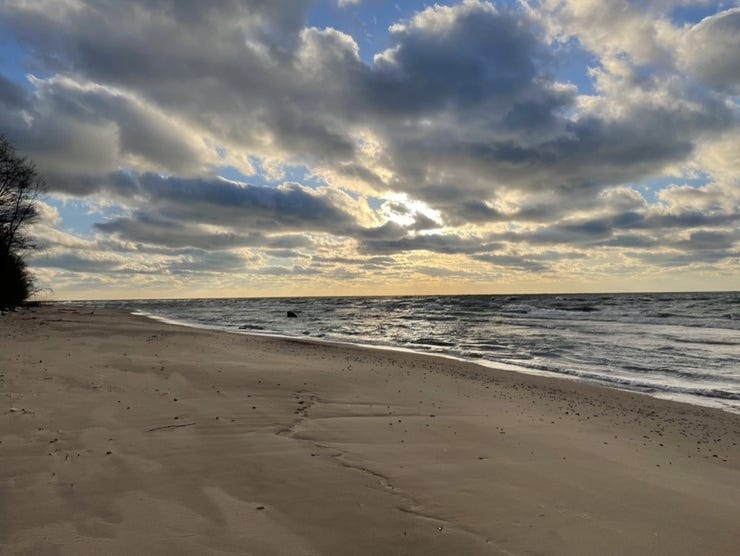Refugia Newsletter #29: faith leaders and ecocide law, a Pew study on faith and climate attitudes, floating wetlands, and God's wildness
Refugia News
Advent, a friend recently pointed out to me, "is the only honest season." It's the season in which the church invites us to feel that aching distance between the world we know and the flourishing we long for. During Advent, we lean into that ardent longing, praying alongside the faithful throughout all generations that God might "rend the heavens and come down." We perceive, with the help of the prophets, the "clash of kingdoms" still at work in the world, and we wait in faith for the fulfillment of what God has promised.
There's a reason that Chapter 1 of Refugia Faith reflects on Advent themes. Well, the main reason is that Advent is officially the first season of the church year. But beyond that, Advent longing is where so many us live, year-round. So it's only right to begin there, dwelling honestly in our longing and seeking God's presence there.
May you experience consolation and hope in this Advent season, light in the darkness, sustenance in the wilderness.
This Week in Climate News
Well, there will indeed be a "loss and damage fund." That's the result of a last-minute deal at COP27. Reversing its earlier resistance, the US finally agreed to help make it happen. How much? From whom? Who administers it? Eh. All those sorts of devil-in-the-details were pushed off until next year. Even so, the decision is considered an important win for global climate justice, since it acknowledges the responsibility of richer countries, who have done the most to cause climate change, to help pay for climate-related loss and damages already suffered by poorer countries.
Not a lot to say on that story, so let's focus instead on a new book released at COP27 called Faith Voices for Ecocide Law. The book gathers texts from numerous religious leaders to make a faith-based, moral argument for an international law that would make ecocide a crime.
Religious leaders from 50 countries have formed Faith for Ecocide Law, "an interreligious coalition gathering religious and spiritual leaders and voices to express support for an international crime of Ecocide."
Using the law to combat environmental destruction is a growing strategy. The "rights of nature" movement, for example, helps put legal teeth in protection laws and gives citizens some legal leverage to use with big polluters or would-be destroyers of lands and waters.
A 2021 article in Inside Climate News by Katie Surma sums up the "rights of nature" philosophy:
"The doctrine holds that nature and its component parts are not 'things' or property but living beings with intrinsic value and an inherent right to exist. The idea is centuries old, existing primarily in Indigenous and other land-based cultures. But with pollution and deforestation threatening vast swaths of the planet and climate change amplifying sea level rise, extreme weather and mass migration, the concept of granting rights to nature has gained saliency and urgency across the globe over the last 15 years."
The idea of declaring ecocide an international crime is another legal strategy for creating stronger mechanisms of accountability.
The book Faith Voices for Ecocide Law is available for free here.
For an excellent, in-the-weeds introduction to how people are deploying legal strategies to combat ecological destruction in specific cases, I highly recommend the excellent podcast Damages.
Deeper Dive
For a long time, I've been meaning to write to the public suggestion box at Pew Research and encourage them to do a thorough new study on religious people in the US and their attitudes about climate, as well as what US churches are actually doing about climate. Well, I never did get around to sending in my suggestion, but never mind! Pew did the work anyway!
The extensive study, released Nov. 17, is worth reading through carefully. Bottom line: depressing. Why? Religious people are happy to make theological claims about how God wants them to care for the earth. But religion overall actually seems to get in the way of taking climate change seriously or engaging in anything more than small, personal actions. You will not be surprised to hear that these results reflect the strong influence of political affiliation.
A few representative stats:
* Only "8% of all Americans are both highly religious and very concerned about climate change."
* "Religiously unaffiliated adults – those who describe themselves as atheists, agnostics or 'nothing in particular' – are much more likely to say climate change is an extremely or very serious problem (70%) than are religiously affiliated Americans as a whole (52%)."
* Of all religious groups, evangelical Protestants were the least likely to believe that global warming is caused by human activities (32%). The higher your religious commitment, the less likely you are to believe in anthropocentric climate change (39% for high vs. 70% for "low religious commitment").
* Among religious service attenders overall, 70% seldom or never hear a sermon addressing climate change and 78% seldom or never talk about climate change with members of their congregation.
* "Upward of half (54%) of all Americans (including two-thirds of religiously affiliated adults) say [that] dominionism mostly or entirely reflects their opinions." Dominionism, in the survey, is the idea that "God gave humans the right to use the Earth, including the plants and animals, for humanity’s benefit." Admittedly, that's a fairly mild version of dominionism. Interestingly, 48% of American adults surveyed agree that both dominionism AND stewardship mostly or entirely reflect their views, with stewardship defined as "God gave humans a duty to protect and care for the Earth, including the plants and animals."
* Christians as a whole are much more likely to participate in at least four personal activities related to the environment, like using fewer plastics or carpooling, (43%) than even one civic activity, like contacting an elected official or donating to an eco-focused organization (21%).
All of this adds up, in my view, to a serious failure of discipleship in Christian contexts (I will not speak about other faiths). We Christians are happy to talk about stewardship, but it remains a toothless concept, allowing us to remain mostly concerned for personal freedom and economic prosperity. We are less likely than non-religious folk to take climate change seriously or engage in civic actions. We are shaped more by economic and political influences than by religious claims.
What to make of all this? I don't know. I suppose we knew this already, but: there's so much work to do. Imagine what would happen if the number of highly religious Americans who were also deeply concerned about climate change jumped from 8% to 78%! What a force to reckon with.
Refugia Sighting
Floating refugia? Sure! Why not?
This delightful article by Susan Cosier in YaleEnvironment360 details how researchers, governments, and municipalities all over the world are experimenting with creating floating wetlands to help clean up polluted waterways and restore habitats and ecosystem services in urban ecosystems. Cosier writes that a project on the Chicago River "is one of many proliferating around the world as cities increasingly look to green infrastructure to address toxic legacies."
The basic idea is to create an open, floating structure and then add plants known to be good at filtering toxins. Properly designed and monitored, "These systems take up excess agricultural nutrients that can lead to algal blooms and dead zones, and recent research suggests they could be used to reduce manmade contaminants that persist in the environment." Even contaminants as nasty as PFAS, apparently.
The structures also provide habitat underneath--for mussels and fish--and above--for birds like herons.
The Wayback Machine
As I think about that Pew study, I wonder once again how we can reclaim the treasures already at hand in the scriptures and the theological tradition--while also renewing that tradition. This piece from April of 2021 reflects on how badly we want to "tame" God, make God small and manageable and suited to our desires. And yet, that is not the God of scripture or the God of nature, a God whose wildness and mystery are both terrifying and also deeply comforting.
Thank you!
Thanks for reading! I keep these newsletters quickly scannable, with opportunities for deeper reading as you are able. I also tend to emphasize the connections between faith communities and climate action.
You can send me a response to this newsletter simply by replying to the email that brought it to you. If you are so inclined, please follow me on Facebook @debrakrienstra. You can always contact me there. Also check out my website at debrarienstra.com. (Note: I am taking a break from Twitter, though I still have my accounts there for now.)
If you like this newsletter, please share with others!





